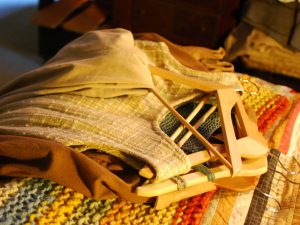Your wedding day is obviously one of the biggest days of your life — but it can also be huge for your carbon footprint. In the UK, the average cost of a wedding is over £20,000. Not only is this a huge amount of money to spend on a single day, but it often means that so many resources are also used for that one day. From your honeymoon and organising transport for your guests, to your menu and table settings, there are many ways to reduce not only the money you spend on your wedding, but the impact of this one day upon the environment.
Stay Local and Encourage Carpooling
‘Destination weddings’ (i.e. weddings a long way from where most of your guests live) are on the rise, with one in four weddings now being considered as a destination wedding. With the number of people now living abroad or in a different part of the UK, even without it being a destination wedding, for most guests, attending a wedding involves far more than just a stroll down the road.
Whether it’s by simply encouraging carpooling, setting up email lists of guests willing to share accommodation, or offering out-of-towners and bed, a little bit of thought can save a lot of unnecessary fuel from being burned. If you really must go abroad, save it for the honeymoon (at least that’s only two of you) and keep your wedding local. Your guests’ bank accounts and the environment will thank you.

Hire a Waste-Conscious Caterer
If you’re in the middle of wedding planning, trying to plan the menu will be something high on your list of priorities. Buffet or sit-down meal? To potluck or not to potluck? In the UK, 7.3 million tonnes of food was wasted in 2015 in households alone — a figure which is only set to rise. The majority of wasted food is salvageable, so if you’re conscious of this in your home, there’s no reason not to extend this eco-consciousness to your wedding.
A few years ago, a couple in London who were going to extreme lengths to have an eco-friendly wedding created an entire wedding menu out of waste food. They hired caterers who were up to the challenge and sourced produce that would otherwise have been thrown away.
If this seems like a step too far, hiring an independent caterer who has a strategy for the waste is still an excellent option. Independent caterers are far more likely to have a plan of action for the waste than larger companies; it’s possible that they’ll already have connections with local homeless shelters and food drives. Providing more vegan and vegetarian options is also a great option for lowering the impact of your menu, as animal agriculture is a major contributor to global warming and deforestation.
Once you’ve sorted out the food itself, don’t forget what it’s served on. Ditch the disposables and try to find ceramic plates, glasses and silverware. If your catering company can’t provide them, try and hire from elsewhere or do a mass borrow from the attics of friends and family. Wedding dress shops in London or your local city can recommend wedding accessory rental suppliers, so you don’t accumulate too many items you need to store afterwards. If you’d prefer to buy than borrow, you can try thrift stores for a cheap and trendy, mismatched look that’s both stylish and planet-friendly.

Don’t Get Carried Away With Clothing
When considering our carbon footprint, clothing is one of the biggest culprits which often gets overlooked. In the UK, we only wear around 70% of what’s in our wardrobe, which means we have 1.7 billion items sitting around, unworn. This demand for a constant supply of new clothing is wreaking havoc on the people, the animals and the environment of developing countries.
A wedding is a common excuse to buy a whole new outfit — or for two or three new and expensive outfits, in the case of the bride. For your guests, encourage a flexible dress code that will allow them to wear something they already have and maybe don’t get to wear that often, and discourage them from buying something new. When choosing a wedding dress, make sure to select one that will make the transition from ceremony to reception, or pick a dress you already own to change into.
If it’s possible to use a hand-me-down dress and get it altered to suit your size and style, this is a fantastic upcycling option that helps the environment. If you’re looking for budget wedding dress options in London, then going second-hand or making your own is a possibility. Another option is to look for a wedding dress sample sale in London. Sample collections are often put together by independent suppliers, so you’re supporting a local business. Sample collections are cheaper and more eco-friendly, as they are dresses which would otherwise go to waste.
From scouring the wedding dress shops of London for second-hand and eco-friendly options, to sourcing as much as possible locally, transforming your wedding from a fossil-fuel fiesta to an eco-extravaganza is easier than you might think. A little bit of extra time, thought and planning will not only contribute to cutting your carbon footprint, but will also significantly cut your costs as you find yourself scaling back. If you’re planning your wedding already, look through your plans with an eco-conscious eye and see what you can change for the better.

—————————
Thanks Jo. Chatting with friends of Lowimpact.org about their weddings, their ideal weddings, or wedding they’ve attended, here are some more ideas.
Not getting married at all came up a lot – although it was always admitted that a wedding is always a good excuse for a party. A lot of people don’t see any reason to get married any more, and they may have a point – but nevertheless, a lot of people still do it, so we may as well do it as sustainably as possible. That goes for a lot of our other topics – we could survive without meat, cars, computers, and ultimately, almost everything except food and shelter. But people do those things, so let’s work out the most sustainable ways to do them – including weddings (and other events / parties).
Lots of companies have sprung up to provide things on an ever-expanding list of what people now seem to think are essential for a wedding. But a lot of these things are either unnecessary, can be home-made, or at the very least, provided by small, local companies. Here are some examples.
No engagement ring, or at least you could do what the ancient Egyptians did – gave engagement rings made of braided reeds. Well, an engagement is only supposed to be temporary! Engagement rings were going out of fashion at the beginning of the 20th century, but a concerted campaign by De Beers persuaded (and pressured) young people that not only was an engagement ring indispensable, it also had to involve a diamond. How could he possibly love her if he didn’t buy her a diamond. I’m guessing that if you’re reading this, you wouldn’t fall for that one.
Instead of an expensive venue, try talking to farmers, to ask if you can put a marquee on one of their fields for a weekend. It will still cost you something, but much less than the castles or stately homes that bridal magazines seem to be promoting nowadays. Also, in a field you can probably have a fire, and guests can camp if they like. It also probably means that your party doesn’t have to end until you feel like it.
Make your own entertainment – with open mic, music and dancing.
Tell guests to treat it like a mini-festival, so no-one has to buy a new hat.
No honeymoon, or honeymoon in the UK.
Recycled silver wedding rings – not too expensive, will last forever, and don’t require any new resources or mining. If you have an heirloom ring from the family, even better. You can find craftspeople online who will melt down silver items that you may have to make rings to your own design.
Favours – gifts from the couple to their guests, to take away at the end of the wedding. At a recent wedding, the favours were home-grown blackcurrant bushes. Ours is in our garden, giving us more and more fruit each year.
At the same wedding, there were compost loos at the edge of the field.
Flowers – home-grown or buy from small, UK growers.
Home-made booze.












2 Comments
I have a theory that marriages last in inverse proportion to the money spent on them! People (and, sorry, usually women) in love with the idea of the wedding rather than the person they’re marrying.
We got up, drove to the registry office with a quick stop off for a brandy at the pub along with a few friends on the way. After we were hitched it was onto a pub’s front room with a cheap buffet for the relatives who we sent home at 6pm. Back home where the party was in full swing – catering by friends and ‘bring food & drink’ friends. Next day we headed off with some friends and their kids for a honeymoon week in Wales (near where we live now!) – when we got back the party was winding down as even the demijohns of nearly finished wine had been drunk. Legendary!
Cost of the wedding – about £150 in today’s money.
That was 35 years ago now.
There you go. You’re living proof that a wedding doesn’t have to cost 20k.